Denise Verrico's Blog: Immortyl Revolution, page 14
August 18, 2011
Do Vampire Books and Movies Inspire People to be Psycho Killers?
I've been reading some of the items of the "vampire" attack in Texas. The perpetrator, nineteen-year-old Lyle Monroe Bensley, is currently awaiting psychiatric evaluation in jail on burglary charges in Galveston, Texas for breaking into a woman's home and trying to "suck her blood.". From time to time, there have been "vampire attacks" in other places. I always find it interesting that when one mentally unstable or drug-induced individual acts out in this way, there is always a rush to pin the blame somewhere. Whether it's reading The Catcher in the Rye or doing away with prayer in school, something has to be "responsible" for the behavoir.
Could it be that this kind of act is just is a symptom of someone who has deep emotional problems, rather than the influence of entertainment featuring a creature that most of us understand to be mythical? I really have to laugh when spokespeople in the media point to "Twilight". If this pop culture phenom has a negative influence it's perhaps just the plethora of pre-teen girls wearing shirts that say, "I Love Boys that Sparkle". As someone who has loved vampire stories since I was a small child, I can't honestly say that watching Dark Shadows made me want to go our and suck people's blood. Okay, I'll admit to tying a towel around my neck and donning plastic fangs to scare my little brother.
There's a book called The Sorrows of Young Werther written by Johann Wolfgang Von Goethe and first published in 1774. In it, the hero commits suicide over an unrequited love. The novel inspired a rash of young men to run around Europe dressing and acting like Werther, the hero. There were even some "Werther" suicides. Did these young men commit suicide because of the novel or because they suffered from an undiagnosed mental illness? The sciences of psychology and psychiatry exist in Goethe's time, so we'll probably never know. I think we can all agree that people who act in an extreme fashion are having serious issues of some kind.
So let's go on enjoying our monsters in books and movies, where they are safe. We should try to help identify mental illness in our children and help them before they do harmful things. There are real monsters out there who exploit and harm people. God knows, we've dealt a lot with monstrous human beings throughout the ages.
Could it be that this kind of act is just is a symptom of someone who has deep emotional problems, rather than the influence of entertainment featuring a creature that most of us understand to be mythical? I really have to laugh when spokespeople in the media point to "Twilight". If this pop culture phenom has a negative influence it's perhaps just the plethora of pre-teen girls wearing shirts that say, "I Love Boys that Sparkle". As someone who has loved vampire stories since I was a small child, I can't honestly say that watching Dark Shadows made me want to go our and suck people's blood. Okay, I'll admit to tying a towel around my neck and donning plastic fangs to scare my little brother.
There's a book called The Sorrows of Young Werther written by Johann Wolfgang Von Goethe and first published in 1774. In it, the hero commits suicide over an unrequited love. The novel inspired a rash of young men to run around Europe dressing and acting like Werther, the hero. There were even some "Werther" suicides. Did these young men commit suicide because of the novel or because they suffered from an undiagnosed mental illness? The sciences of psychology and psychiatry exist in Goethe's time, so we'll probably never know. I think we can all agree that people who act in an extreme fashion are having serious issues of some kind.
So let's go on enjoying our monsters in books and movies, where they are safe. We should try to help identify mental illness in our children and help them before they do harmful things. There are real monsters out there who exploit and harm people. God knows, we've dealt a lot with monstrous human beings throughout the ages.
Published on August 18, 2011 17:14
August 17, 2011
Creating Characters
Creating Memorable Characters
I thought I might share some thoughts on creating characters. In writing My Fearful Symmetry, I had to stretch the creative muscles in bringing to life a character far outside of my personal experience. This is the kind of challenge that makes me tick as a writer. Writers are often told to stick to the familiar in creating characters. This is true in some senses and a good starting point for the new writer. However, speculative fiction is always stepping outside of the norm of experience. The author's task is to build a believable world out of the alien, and this includes characters that are often vastly different than human beings.
The third book in my urban fantasy series is written from a different POV than the first two. The first books have an Italian-American female protagonist. She is a young actress in New York City. Her ethnicity and profession are somewhat similar to my background–but she was born in 1930 and becomes a vampire. Whoa, now the imagination must kick in. Then, out of nowhere, another character was born in my head and begged to step into the spotlight. He took me on a pretty wild ride.
I'm a heterosexual, American, all-too-human female, yet in this third book I write from the first-person POV of a bisexual, Scottish, vampire male. Is this too far out of my sphere of experience to write? Well, I don't know any genuine vampires. That one is probably out of nearly everyone's experience. Can an American truthfully render a person from another country? Do I, a female, have the right to get inside the male psyche? Does a straight person understand how a gay person feels?
The answer is yes. Every character written is part the author, part research and part pure imagination. I happen to think "typical" people don't usually make for interesting characters. It is the extraordinary person that often becomes the hero or heroine of the book, even if he or she appears to lead a rather ordinary life. Jane Austen wrote about acerbic, critical Lizzie Bennett, not sweet, obedient Jane Bennett. Tolkien chose to write about the restless Frodo and Bilbo, not the peaceful Hobbit folk of the shire. The writer must find that person who for some reason stands out from the pack.
My training is in acting. The master acting teacher, Stanislavski, speaks of something called the "Magic If". In other words, what would I do in if thrust into this character's given circumstances? All people share common experiences and desires that allow us to empathize. Even if the writer is dealing with a fantastical creature like an elf, alien or an android, the character must be approached as a person with an internal conflict.
The trick in writing someone so "different" from oneself is to thoroughly think out what this character is all about. Stanislavski also said, "generality is the enemy of all art." Make your character's traits, likes and dislikes, and deeply held beliefs very specific. A character's religion or lack of it tells a lot about that person. Give him or her a ruling passion or obsession, a family history and lots of emotional baggage. Everyone experiences these things.
First off, I create back-stories for all of my major characters. All of this is for my personal use and only bits will show up in a book. How the personal history impacts the character is the important thing. For example, I have a character in my series, Kurt Eisen, who as a teenager was in a concentration camp in Nazi Germany. He lost his entire family and did some unsavory things to survive. His vampire master ultimately gives him immortality. This all adds up to a heavy burden that Kurt carries with him for a half-century. It fills him with a sense of wanting to right wrongs and spurs him to fight injustice.
There a many good exercises for developing well-rounded characters. I tend to fall back on those I learned in acting and keep a character "notebook". This is always fun for me. I ask myself all sorts of questions about my character, even if the information never ends up in the book. It helps to do a lot of research. I also look for images, art, mythology, poetry and music that relate to this character. These I keep in a file, along with my research notes. Research need not only come from books. For my last novel, I watched a several TV shows featuring British teenagers to get the slang and rhythm of the speech. I then had a British beta reader check my manuscript for accuracy. You may not want to keep a detailed character notebook on incidental characters, but they deserve to be given a thorough look to give them some interesting traits in a brief appearance.
There are some who feel what a character looks like isn't important. Wrong. While long descriptive passages of narrative slow down a story, a hint of the physical appearance of a character and his garb can speak volumes about who he or she is. Mother Teresa didn't dress or behave like Lady Gaga. The way other characters treat your heroine because of her appearance says a lot about character relationships and informs conflict. A beautiful person takes for granted advantages that a plain person would love to have. Conversely a beautiful person may feel his mind and abilities are unappreciated. These hints come out in dialogue or action. Instead of saying the hero is very tall, let him drop that information by having him looking down to talk with a friend. The way a villain speaks to a woman he desires will be very different than one he hardly notices.
Another important consideration to keep in mind is gender, sexuality and race. These come into play in a person's development through both nature and nuture. We all experience the difference in how the sexes are socialized. There are differing views on how men and women are hard wired, but as a writer it's important to remember that not every man or woman will behave in the expected way. Every character, like every person, is an individual. A person's sexual and racial identity is very important in determining that person's place in a culture. Sexual and racial minorities face daily conflicts that the majority doesn't. Experience will affect how a person of a different race or sexuality responds to conflicts. Things a heterosexual person takes for granted, like holding hands with a lover in public, becomes a taboo in many places. How a minority is treated a given environment may highlight the prejudice of characters.
An interesting way to define your characters is to give them a "job", even if they are creatures of fantasy realms. This can add a lot of texture to the story and uncover conflict. Say you're writing historical fiction or fantasy. If your character is a servant or courtesan in the royal court, it gives him or her a different perspective than the king's closest advisor or a general of his army.
One final point I'd like to touch on is the character's flaws and weaknesses. Don't be afraid of a few warts. A character can be sympathetic and yet sometimes behave cruelly or like a complete ass. He or she can show poor judgment at times. Nobody is perfect. Don't forget odd quirks and pet peeves. Remember that you want to show your character's growth. I had a writing group member read an isolated, early chapter in my third book. She commented that she hated the hero for acting stupid and immature toward a woman who was teaching him. Well, in the chapter she'd read, this nineteen-year-old boy was acting like a spoiled brat. He was definitely cruising for a bruising. I took the reader's comment and amended the chapter to show the teacher dealing the boy a well-deserved comeuppance. However, this group member hadn't read an earlier chapter where we see the hero suffering through a low point in his life. He garners sympathy in the previous chapters through his struggles. There is a learning curve where the character faces obstacles and starts to care about the plight of others around him. The young man with a mission at the end of the book is very different than the vain, selfish boy in that early chapter.
In a story, the journey is the thing. Getting there is all the fun.

I thought I might share some thoughts on creating characters. In writing My Fearful Symmetry, I had to stretch the creative muscles in bringing to life a character far outside of my personal experience. This is the kind of challenge that makes me tick as a writer. Writers are often told to stick to the familiar in creating characters. This is true in some senses and a good starting point for the new writer. However, speculative fiction is always stepping outside of the norm of experience. The author's task is to build a believable world out of the alien, and this includes characters that are often vastly different than human beings.
The third book in my urban fantasy series is written from a different POV than the first two. The first books have an Italian-American female protagonist. She is a young actress in New York City. Her ethnicity and profession are somewhat similar to my background–but she was born in 1930 and becomes a vampire. Whoa, now the imagination must kick in. Then, out of nowhere, another character was born in my head and begged to step into the spotlight. He took me on a pretty wild ride.
I'm a heterosexual, American, all-too-human female, yet in this third book I write from the first-person POV of a bisexual, Scottish, vampire male. Is this too far out of my sphere of experience to write? Well, I don't know any genuine vampires. That one is probably out of nearly everyone's experience. Can an American truthfully render a person from another country? Do I, a female, have the right to get inside the male psyche? Does a straight person understand how a gay person feels?
The answer is yes. Every character written is part the author, part research and part pure imagination. I happen to think "typical" people don't usually make for interesting characters. It is the extraordinary person that often becomes the hero or heroine of the book, even if he or she appears to lead a rather ordinary life. Jane Austen wrote about acerbic, critical Lizzie Bennett, not sweet, obedient Jane Bennett. Tolkien chose to write about the restless Frodo and Bilbo, not the peaceful Hobbit folk of the shire. The writer must find that person who for some reason stands out from the pack.
My training is in acting. The master acting teacher, Stanislavski, speaks of something called the "Magic If". In other words, what would I do in if thrust into this character's given circumstances? All people share common experiences and desires that allow us to empathize. Even if the writer is dealing with a fantastical creature like an elf, alien or an android, the character must be approached as a person with an internal conflict.
The trick in writing someone so "different" from oneself is to thoroughly think out what this character is all about. Stanislavski also said, "generality is the enemy of all art." Make your character's traits, likes and dislikes, and deeply held beliefs very specific. A character's religion or lack of it tells a lot about that person. Give him or her a ruling passion or obsession, a family history and lots of emotional baggage. Everyone experiences these things.
First off, I create back-stories for all of my major characters. All of this is for my personal use and only bits will show up in a book. How the personal history impacts the character is the important thing. For example, I have a character in my series, Kurt Eisen, who as a teenager was in a concentration camp in Nazi Germany. He lost his entire family and did some unsavory things to survive. His vampire master ultimately gives him immortality. This all adds up to a heavy burden that Kurt carries with him for a half-century. It fills him with a sense of wanting to right wrongs and spurs him to fight injustice.
There a many good exercises for developing well-rounded characters. I tend to fall back on those I learned in acting and keep a character "notebook". This is always fun for me. I ask myself all sorts of questions about my character, even if the information never ends up in the book. It helps to do a lot of research. I also look for images, art, mythology, poetry and music that relate to this character. These I keep in a file, along with my research notes. Research need not only come from books. For my last novel, I watched a several TV shows featuring British teenagers to get the slang and rhythm of the speech. I then had a British beta reader check my manuscript for accuracy. You may not want to keep a detailed character notebook on incidental characters, but they deserve to be given a thorough look to give them some interesting traits in a brief appearance.
There are some who feel what a character looks like isn't important. Wrong. While long descriptive passages of narrative slow down a story, a hint of the physical appearance of a character and his garb can speak volumes about who he or she is. Mother Teresa didn't dress or behave like Lady Gaga. The way other characters treat your heroine because of her appearance says a lot about character relationships and informs conflict. A beautiful person takes for granted advantages that a plain person would love to have. Conversely a beautiful person may feel his mind and abilities are unappreciated. These hints come out in dialogue or action. Instead of saying the hero is very tall, let him drop that information by having him looking down to talk with a friend. The way a villain speaks to a woman he desires will be very different than one he hardly notices.
Another important consideration to keep in mind is gender, sexuality and race. These come into play in a person's development through both nature and nuture. We all experience the difference in how the sexes are socialized. There are differing views on how men and women are hard wired, but as a writer it's important to remember that not every man or woman will behave in the expected way. Every character, like every person, is an individual. A person's sexual and racial identity is very important in determining that person's place in a culture. Sexual and racial minorities face daily conflicts that the majority doesn't. Experience will affect how a person of a different race or sexuality responds to conflicts. Things a heterosexual person takes for granted, like holding hands with a lover in public, becomes a taboo in many places. How a minority is treated a given environment may highlight the prejudice of characters.
An interesting way to define your characters is to give them a "job", even if they are creatures of fantasy realms. This can add a lot of texture to the story and uncover conflict. Say you're writing historical fiction or fantasy. If your character is a servant or courtesan in the royal court, it gives him or her a different perspective than the king's closest advisor or a general of his army.
One final point I'd like to touch on is the character's flaws and weaknesses. Don't be afraid of a few warts. A character can be sympathetic and yet sometimes behave cruelly or like a complete ass. He or she can show poor judgment at times. Nobody is perfect. Don't forget odd quirks and pet peeves. Remember that you want to show your character's growth. I had a writing group member read an isolated, early chapter in my third book. She commented that she hated the hero for acting stupid and immature toward a woman who was teaching him. Well, in the chapter she'd read, this nineteen-year-old boy was acting like a spoiled brat. He was definitely cruising for a bruising. I took the reader's comment and amended the chapter to show the teacher dealing the boy a well-deserved comeuppance. However, this group member hadn't read an earlier chapter where we see the hero suffering through a low point in his life. He garners sympathy in the previous chapters through his struggles. There is a learning curve where the character faces obstacles and starts to care about the plight of others around him. The young man with a mission at the end of the book is very different than the vain, selfish boy in that early chapter.
In a story, the journey is the thing. Getting there is all the fun.
Published on August 17, 2011 06:48
August 16, 2011
I Talk vampire Tantra today with the Tart.
Whew! Exhausting alliteration. Stop by to read my interview by Hart the Tart at her blog Confessions of a Watery Tart. I talk a lot about the research and world building I did for this book.
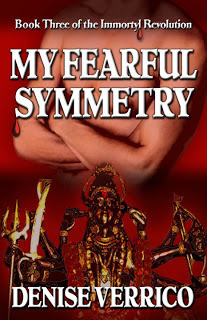


Published on August 16, 2011 06:57
August 13, 2011
National Left Hander's Day
It's time to celebrate the sinister! I'm left handed, and I was intrigued to find I was in interesting company. Add any of your favorite left-handers to the comments!
Four of the past five US Presidents:
Ronald Reagan
George H.W. Bush
Bill Clinton
Barack Obama
Others of Note:
Joan of Arc
Roman Emperor Tiberius
Alexander the Great
Charlemagne
Julius Caesar
Queen Victoria
Prince Charles
Prince William
Fidel Castro
David Letterman
Ron Reagan Jr.
Lenny Bruce
Joel Hodgson
Jack the Ripper
John Dillenger
H. G. Wells
Lewis Carroll
Kurt Cobain
David Byrne
Judy Garland
Jimi Hendrix
Paul Simon
Johnny Rotten
Michelangelo
Raphael
(Not the Ninja Turtles)
George Burns
Charlie Chaplin
This Author is actually writing with her left hand and upside down to boot! How many of you lefties write upside down?
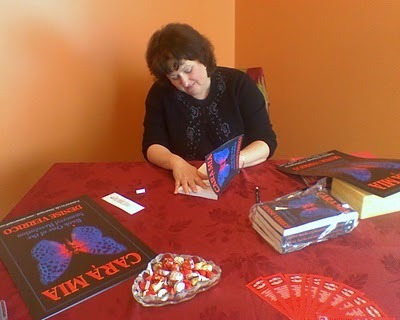

Four of the past five US Presidents:
Ronald Reagan
George H.W. Bush
Bill Clinton
Barack Obama
Others of Note:
Joan of Arc
Roman Emperor Tiberius
Alexander the Great
Charlemagne
Julius Caesar
Queen Victoria
Prince Charles
Prince William
Fidel Castro
David Letterman
Ron Reagan Jr.
Lenny Bruce
Joel Hodgson
Jack the Ripper
John Dillenger
H. G. Wells
Lewis Carroll
Kurt Cobain
David Byrne
Judy Garland
Jimi Hendrix
Paul Simon
Johnny Rotten
Michelangelo
Raphael
(Not the Ninja Turtles)
George Burns
Charlie Chaplin
This Author is actually writing with her left hand and upside down to boot! How many of you lefties write upside down?

Published on August 13, 2011 14:03
August 11, 2011
J. D. Webb Advises Writers to Never Give Up
Today, I welcome mystery author J. D. Webb to Immortyl Revolution. He is another L&L Dreamspell author and he has some wonderful advice on why perseverance is important to an author.
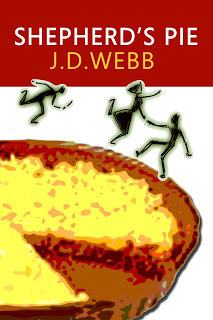 Never Give Up
Never Give Up
I'm often asked why I write. Most authors will tell you it's because it's in our blood. That's basically true, but I have another reason. I love telling stories, jokes, antidotes, and little known facts. Some would say it's to be the center of attention, but I believe it's a desire to be liked. Come to think of it, that is one of Facebook's appeals. To have everyone LIKE you.
Early on I observed that storytellers were popular. In high school I was terribly shy. My friends have commenced to guffaw, I'm sure. I was shy though. I took to basketball, although at five foot seven, basketball didn't take to me. And carrying newspapers to make money negated after school activities. So I doodled and wrote in my spare time. I began to collect and tell jokes and at times concoct stories to become more likable.
I'd been thrown into a creative writing class in high school as punishment for some of my mischief and that opened my eyes. I could put my stories on paper. It was tedious. I couldn't type worth a lick. Rewriting was torture and I couldn't always decipher my handwriting. Most of my authoring at that time was humorous and my teacher's only interest seemed to be forcing us into literary works, looking for the next Shakespeare. Early grades ranged in the Cs and Ds category.
Then, much to my teacher's surprise, a short story of mine won third place in our city-wide short story contest. My grades improved to As and Bs. The story recounted a conversation I had with my younger brother who wanted to hear the fairy tale Cinderella. But he kept asking questions. What's Cinderella's last name? And what's her fairy godmother's name? Soon my story titled Cinderella Jones was born. And so was my writing career.
Some forty-seven years later my first book became a published novel. At age sixty-five I finally became an author. The point to this blog is to offer my philosophy in life. Never give up. Keep plugging. A goal dreamed can be achieved. But don't make your goals overwhelming. Start small and then readjust.
Upon retirement I dove into writing full time. All the years of making up stories came to life and I now have four books in print and available electronically. My single goal was to merely finish a novel. No lofty New York Times Bestseller List placement. Just, could I actually finish a novel? Once I found that I could I haven't stopped. My goal is still to finish the next one.
My latest book, Smudge, recounts the story of Trish Morgan. A paralegal seemingly stuck in a nowhere job with a husband whose mental abuse is escalating. One night she wipes a smudge off her ATM screen and it's blood. Then she hears a moan coming from the alley next to the bank. Should she investigate? She does and her nightmare begins. Dreamspell has honored me by publishing Trish's story. Also, soon a short story of mine called The Drifter will be included in a Dreamspell Anthology, Revenge II.
I'm well into my next story titled Gulf Terror. What if the Gulf oil disaster was a terrorist attack by two suicide bombers? And what if one of them survives and lands in Louisiana to cause more grief? Two Homeland Security agents are on his trail trying to prevent another 9/11. I can't wait to find out what happens.
Never give up.
J. D. Webb 2011
I'd like to thank J. D. for his wonderful post and being my guest today. Below is some more information on him and his books.
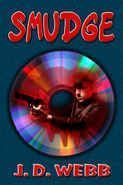 J. D. Webb's website: http://www.jdwebb.com/
J. D. Webb's website: http://www.jdwebb.com/
Shepherd's Pie (Golden Wings Award Winner)
Moon Over Chicago (2008 Eppie finalist)
Her Name Is Mommy (Now Available)
Smudge available now at http://www.lldreamspell.com/
Stuck In Valhalla (available at Sniplits)
J. D. (Dave) Webb resides in Illinois with his wife of 40 years and their toy poodle, Ginger, losing all family votes 2 to 1. Dave served in the Security Service of the Air Force as a Chinese linguist and weather analyst in Viet Nam and the Philippines prior to spending 25 years in corporate management. A company purge promoted him to cobbler and he owned a shoe repair and sales shop for 11 years. During these careers he wrote short stories and suppressed an urge to write a novel. After making a conscious decision to live at the poverty level, those novels began forcing their way out.
Becoming a full time author in 2002, Dave has garnered several awards. A short story called The Key to Christmas placed third in the 2006 La Belle Lettre literary contest. His first novel Shepherd's Pie won a publisher's Golden Wings Award for excellence in writing. His second novel Moon Over Chicago was a top ten finisher in the 2008 Preditors and Editors Poll in the mystery category and was a finalist in the prestigious 2008 Eppie awards by the Electronic Publishing Internet Connection. He is also the Owner and Moderator of the Publishing and Promoting Yahoo group with almost 900 international members.
His L&L Dreamspell Books and Anthologies:SmudgeDreamspell Revenge 2 - Mystery/Suspense Anthology - Featuring "The Drifter" by J.D. WebbOther Books and Stories by JD Webb:Shepherd's PieMoon Over Chicago Her Name Is Mommy
Smudge Stuck in Valhalla

 Never Give Up
Never Give UpI'm often asked why I write. Most authors will tell you it's because it's in our blood. That's basically true, but I have another reason. I love telling stories, jokes, antidotes, and little known facts. Some would say it's to be the center of attention, but I believe it's a desire to be liked. Come to think of it, that is one of Facebook's appeals. To have everyone LIKE you.
Early on I observed that storytellers were popular. In high school I was terribly shy. My friends have commenced to guffaw, I'm sure. I was shy though. I took to basketball, although at five foot seven, basketball didn't take to me. And carrying newspapers to make money negated after school activities. So I doodled and wrote in my spare time. I began to collect and tell jokes and at times concoct stories to become more likable.
I'd been thrown into a creative writing class in high school as punishment for some of my mischief and that opened my eyes. I could put my stories on paper. It was tedious. I couldn't type worth a lick. Rewriting was torture and I couldn't always decipher my handwriting. Most of my authoring at that time was humorous and my teacher's only interest seemed to be forcing us into literary works, looking for the next Shakespeare. Early grades ranged in the Cs and Ds category.
Then, much to my teacher's surprise, a short story of mine won third place in our city-wide short story contest. My grades improved to As and Bs. The story recounted a conversation I had with my younger brother who wanted to hear the fairy tale Cinderella. But he kept asking questions. What's Cinderella's last name? And what's her fairy godmother's name? Soon my story titled Cinderella Jones was born. And so was my writing career.
Some forty-seven years later my first book became a published novel. At age sixty-five I finally became an author. The point to this blog is to offer my philosophy in life. Never give up. Keep plugging. A goal dreamed can be achieved. But don't make your goals overwhelming. Start small and then readjust.
Upon retirement I dove into writing full time. All the years of making up stories came to life and I now have four books in print and available electronically. My single goal was to merely finish a novel. No lofty New York Times Bestseller List placement. Just, could I actually finish a novel? Once I found that I could I haven't stopped. My goal is still to finish the next one.
My latest book, Smudge, recounts the story of Trish Morgan. A paralegal seemingly stuck in a nowhere job with a husband whose mental abuse is escalating. One night she wipes a smudge off her ATM screen and it's blood. Then she hears a moan coming from the alley next to the bank. Should she investigate? She does and her nightmare begins. Dreamspell has honored me by publishing Trish's story. Also, soon a short story of mine called The Drifter will be included in a Dreamspell Anthology, Revenge II.
I'm well into my next story titled Gulf Terror. What if the Gulf oil disaster was a terrorist attack by two suicide bombers? And what if one of them survives and lands in Louisiana to cause more grief? Two Homeland Security agents are on his trail trying to prevent another 9/11. I can't wait to find out what happens.
Never give up.
J. D. Webb 2011
I'd like to thank J. D. for his wonderful post and being my guest today. Below is some more information on him and his books.
 J. D. Webb's website: http://www.jdwebb.com/
J. D. Webb's website: http://www.jdwebb.com/Shepherd's Pie (Golden Wings Award Winner)
Moon Over Chicago (2008 Eppie finalist)
Her Name Is Mommy (Now Available)
Smudge available now at http://www.lldreamspell.com/
Stuck In Valhalla (available at Sniplits)
J. D. (Dave) Webb resides in Illinois with his wife of 40 years and their toy poodle, Ginger, losing all family votes 2 to 1. Dave served in the Security Service of the Air Force as a Chinese linguist and weather analyst in Viet Nam and the Philippines prior to spending 25 years in corporate management. A company purge promoted him to cobbler and he owned a shoe repair and sales shop for 11 years. During these careers he wrote short stories and suppressed an urge to write a novel. After making a conscious decision to live at the poverty level, those novels began forcing their way out.
Becoming a full time author in 2002, Dave has garnered several awards. A short story called The Key to Christmas placed third in the 2006 La Belle Lettre literary contest. His first novel Shepherd's Pie won a publisher's Golden Wings Award for excellence in writing. His second novel Moon Over Chicago was a top ten finisher in the 2008 Preditors and Editors Poll in the mystery category and was a finalist in the prestigious 2008 Eppie awards by the Electronic Publishing Internet Connection. He is also the Owner and Moderator of the Publishing and Promoting Yahoo group with almost 900 international members.
His L&L Dreamspell Books and Anthologies:SmudgeDreamspell Revenge 2 - Mystery/Suspense Anthology - Featuring "The Drifter" by J.D. WebbOther Books and Stories by JD Webb:Shepherd's PieMoon Over Chicago Her Name Is Mommy
Smudge Stuck in Valhalla
Published on August 11, 2011 21:03
August 9, 2011
Travis McBee talks about Bridgeworld
Welcome to Travis McBee! I had the pleasure of meeting Travis at Fandom Fest a few weeks ago. He was launching Bridgeworld, and I found what he to say about the book very interesting. Especially since the book is YA science fiction. Please read on to see what Travis has to say.
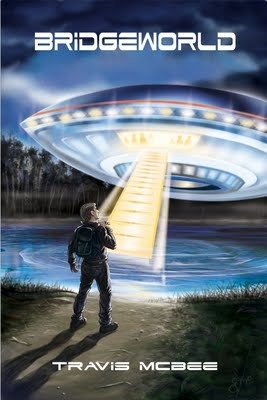
DV: Travis, toward what age group is your work geared?
TM: Bridgeworld was written for young adults but it has enough mature topics and hidden humor in it to amuse adults as well.
DV: Into which genre would you say your work falls and why?
TM: My work fits very cleanly into the Science Fiction genre based on its setting alone. It also comprises elements of a Coming of Age novel as the main character tries to find out who he really is.
DV: Fantasy and science fiction create a new world for the reader. Tell us about the world you've built.
TM: Bridgeworld consists of two worlds, one is our own and one that exists in space. The world I constructed is as complex and different from ours as I could manage. I hae an entire spiral notebook full of notes to keep things straight. Everything from the food to polite behavior is different. In this new world there are new sports, hobbies, and bracelets that identify your relationship status. One of the favorite pastimes in Bridgeworld is known as 'ticking', or messing with Earthlings.
4. Who is your favorite character in your book and why?
TM: My favorite character would have to be Abby. She is a very carefree person who enjoys the little things in life and would be enthralled in the things we would think of as mundane, such as a cheeseburger or a cell phone. Every time I was writing a scene with her in it I would find myself smiling.
DV: What other writers would you say have influenced your work and why? What are some of your favorite books in your genre?
TM: I'm influenced by everything around me. The idea for Bridgeworld came as I was sitting on my couch watching some cheesy movie. I remembered a book I had read eight or more years ago called The Dark Side of Nowhere by Neal Shusterman. That book was about a a group of teenagers who discovers that their whole town are really aliens. I wondered what it would be like for just one boy to learn that his life wasn't what he thought. Besides that book, Enders Game influenced me tremendously, helping to contribute to the zero-gravity game of zegma.
DV: What is your writing process like? Do you do a lot of background research? Do you plot every detail or do you prefer the characters to move the story in new directions, or a combination of both? Do you belong to a critique group and do you find this helpful?
TM: I write like I go to war. I spend days with a composition book or spiral notebook taking relentless notes. I plan out most of the novel but only in a vague sense. The planning is so that I will eventually get to where I want to go but I usually find myself making wholesale changes while I actually write. I usually have an idea about what the characters will be like but they surprise me a lot of times and morph into something I didn't foresee. To me writing a book is a lot like going on a road trip; I know where I'm going. I know the basic route I'm going to take, but there are always tons of surprises along the way.
DV: Do you have any advice for young or beginning writers?
TM: I have started perhaps half a dozen novels. The reason that I finished Bridgeworld is simple, I was prepared. Start a notebook, make sure you know where you want to end up. If you just go at it most of the time you'll wander around and get bogged down, disheartened, and quit. The most important thing, though, is perseverance. Writing is fun, any author will tell you that, but it can also get boring. I create stories much faster than I can write and many times I feel myself thinking about a new story and yearn to start writing it. I did this several times and that is why I have so many unfinished novels. Finish what you start, it will be worth it.
DV: Who is your publisher, and where are your books available? Are there e-books and hard copies available?
TM: I am published by Hydra Publications. My books are available at Amazon, Barnes and Nobel, and most online retailers. An E-book will be available soon from Smashwords as well as Amazon. Paperbacks are available now.
DV: What is your website and/or blog where readers can learn more? Can they friend you on facebook or other sites?
TM: There is a Bridgeworld fan page on Facebook and there is more information at my publisher's website http://www.hydrapublications.com/
DV: Are there any upcoming signings or appearances you'd like to mention?
TM:I don't have any signings schedule soon but if anyone would like me to make an appearance you can contact me through my facebook page and I will see if I can manage to do it.
Travis, thanks for joining me today! You can follow Travis at his facebook page: http://www.facebook.com/#!/pages/Bridgeworld/172798309452043


DV: Travis, toward what age group is your work geared?
TM: Bridgeworld was written for young adults but it has enough mature topics and hidden humor in it to amuse adults as well.
DV: Into which genre would you say your work falls and why?
TM: My work fits very cleanly into the Science Fiction genre based on its setting alone. It also comprises elements of a Coming of Age novel as the main character tries to find out who he really is.
DV: Fantasy and science fiction create a new world for the reader. Tell us about the world you've built.
TM: Bridgeworld consists of two worlds, one is our own and one that exists in space. The world I constructed is as complex and different from ours as I could manage. I hae an entire spiral notebook full of notes to keep things straight. Everything from the food to polite behavior is different. In this new world there are new sports, hobbies, and bracelets that identify your relationship status. One of the favorite pastimes in Bridgeworld is known as 'ticking', or messing with Earthlings.
4. Who is your favorite character in your book and why?
TM: My favorite character would have to be Abby. She is a very carefree person who enjoys the little things in life and would be enthralled in the things we would think of as mundane, such as a cheeseburger or a cell phone. Every time I was writing a scene with her in it I would find myself smiling.
DV: What other writers would you say have influenced your work and why? What are some of your favorite books in your genre?
TM: I'm influenced by everything around me. The idea for Bridgeworld came as I was sitting on my couch watching some cheesy movie. I remembered a book I had read eight or more years ago called The Dark Side of Nowhere by Neal Shusterman. That book was about a a group of teenagers who discovers that their whole town are really aliens. I wondered what it would be like for just one boy to learn that his life wasn't what he thought. Besides that book, Enders Game influenced me tremendously, helping to contribute to the zero-gravity game of zegma.
DV: What is your writing process like? Do you do a lot of background research? Do you plot every detail or do you prefer the characters to move the story in new directions, or a combination of both? Do you belong to a critique group and do you find this helpful?
TM: I write like I go to war. I spend days with a composition book or spiral notebook taking relentless notes. I plan out most of the novel but only in a vague sense. The planning is so that I will eventually get to where I want to go but I usually find myself making wholesale changes while I actually write. I usually have an idea about what the characters will be like but they surprise me a lot of times and morph into something I didn't foresee. To me writing a book is a lot like going on a road trip; I know where I'm going. I know the basic route I'm going to take, but there are always tons of surprises along the way.
DV: Do you have any advice for young or beginning writers?
TM: I have started perhaps half a dozen novels. The reason that I finished Bridgeworld is simple, I was prepared. Start a notebook, make sure you know where you want to end up. If you just go at it most of the time you'll wander around and get bogged down, disheartened, and quit. The most important thing, though, is perseverance. Writing is fun, any author will tell you that, but it can also get boring. I create stories much faster than I can write and many times I feel myself thinking about a new story and yearn to start writing it. I did this several times and that is why I have so many unfinished novels. Finish what you start, it will be worth it.
DV: Who is your publisher, and where are your books available? Are there e-books and hard copies available?
TM: I am published by Hydra Publications. My books are available at Amazon, Barnes and Nobel, and most online retailers. An E-book will be available soon from Smashwords as well as Amazon. Paperbacks are available now.
DV: What is your website and/or blog where readers can learn more? Can they friend you on facebook or other sites?
TM: There is a Bridgeworld fan page on Facebook and there is more information at my publisher's website http://www.hydrapublications.com/
DV: Are there any upcoming signings or appearances you'd like to mention?
TM:I don't have any signings schedule soon but if anyone would like me to make an appearance you can contact me through my facebook page and I will see if I can manage to do it.
Travis, thanks for joining me today! You can follow Travis at his facebook page: http://www.facebook.com/#!/pages/Bridgeworld/172798309452043
Published on August 09, 2011 00:01
August 8, 2011
Guest Blog on Creating Memorable Characters today at Dames of Dialogue
Stop by and visit Dames of Dialogue to read my post on Creating Memorable Characters. Dames of Dialogue
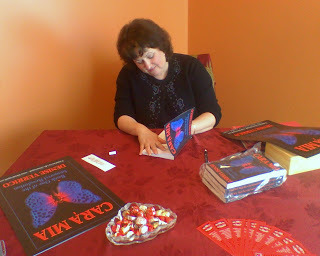


Published on August 08, 2011 17:27
August 5, 2011
Frances Pauli on Speculative Romance
Please welcome Frances Pauli! Frances is kicking off a new feature on my blog that features authors who have books or stories published by L&L Dreamspell, my publisher. Frances has a story, Forbidden, featured in the anthology, Dreamspell Fangs Volume 1. She is a multi-published author of speculative fiction.
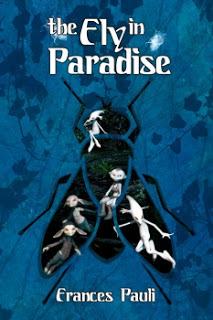
Romantic Speculation
I've always considered myself a die-hard speculative fiction fan. Of course, I'm old enough that we just called it Sci-fi and Fantasy, and it was all lumped neatly onto one shelf. Still, I remained loyal to that shelf, and I devoured the books there. I also enjoyed related movies, comics, and television series in science fiction universes.
I never would have admitted that it was the romance I was watching for.
Don't get me wrong, I prefer an alien setting, a far distant future and a great deal of ship to ship battle around my romance. But while the genre was what got my attention, in fact, it was the romantic sub-plots that kept me watching. I was Specrom before it even had a name.
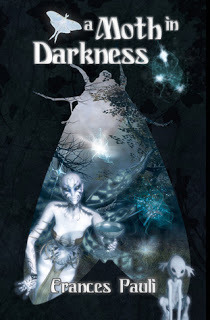
I've confessed before that I thought the whole point of the Star Wars trilogy was to see who Lea ended up with. The battle between rebels and empire played a lovely background symphony, but really, I mean who was she going to pick? I only recently even noticed Stormtroopers, and let me tell you, it's not for their military applications.
My love affair with Star Trek has similar fatal romantic flaws. I watched relationships. The space part rocked, don't get me wrong. But as a fan, it never was my focus. I rifle through my favorites in my mind, Alien Nation, Babylon 5, Firefly, and I come out a romance fan every time. Correction--a science fiction romance fan.
I'm so glad they have that now.
Except, really, we always did. We had authors that you knew would give you a good dose of fluttering heartbeats along with your aliens. Actually, we had a lot of them. Even the male authors tended to provide a good, solid romantic plot along with the primary conflict. It was equal opportunity science fiction, something for everyone.
Still, I'm a very happy woman today as well. Today, we have the cross-genre explosion. Today, romance comes in every flavor of the rainbow. (And some new, completely made-up flavors too) And in keeping with tradition, I can still find that flutter in places on the strictly sci-fi shelf too. I know how to look for it. I've had years of practice. But, depending on my mood, I can go for the Science Fiction Romance section, where the stress is on the heaving, or I can find my gems on the Science Fiction and Fantasy shelf for a slightly subtler dose.
It's a pretty good world to live in and even better to write in. I have a tendency to write like I read, across the spectrum. Sometimes I find stories at my fingertips that barely straddle that line, and sometimes they race off toward the Romance shelf. Very rarely, they only whisper of romance. No matter what, though, they are all speculative. They have aliens…or elves. Maybe that's a statement in itself. Maybe all the time, I was a science fiction and fantasy fan after all.
Maybe the romance drew me, and the spaceships, the magic, the stormtroopers were what held me. And then I think, maybe it doesn't matter. A good story, after all, is a blend of all good things.
Thank you so much for having me visit.
Thanks for being my guest! Here is some more information on Frances and her books:
Frances Pauli writes Speculative fiction with romantic tendencies. HerChangeling Race urban fantasy trilogy is available through MundaniaPress LLC, and her science fiction romance series, Shift Happens canbe found there as well. She also writes SpecRom novellas for DevineDestinies and has self published the first book in her Space Operaseries, Space Slugs. More info on Frances and her writing can be foundat: http://francespauli.com/Frances' Fan Page on Facebook
Published on August 05, 2011 21:16
August 3, 2011
Bertena Varney's The Lure of the Vampire /ebook Giveaway
A very big welcome to Bertena Varney!
Bertena has written a fascinating non-fiction book about the iconic figure of the vampire. I was thrilled when she asked me to contribute an essay to the work. You'll get to read an excerpt of it later in this post. Bertena is giving a PDF ebook away to one lucky commenter. Entry details are at the end of this post.
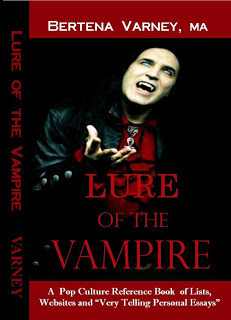
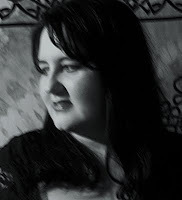
Hi everyone. Lure of the Vampire is my first book and has been an interesting project in the making. It began as my final master's paper and grew into a study of vampires from mythology, history, literature, movies, recreation, and much more.
I found that there was not a lot of research in one place that dealt with all aspects of vampires.. or at least not one that covered all aspects from beginning to current lifestylers. So, I thought that this would be the perfect opportunity to create a quick reference guide for vampire fans, writers, and students.
I began the book with essays that came from my paper and then added more research facts, lists and websites. I then looked to several friends of mine who were vampire authors but each from a different genre. For example Elizabeth Loraine writes young adult literature, David Blue MacDowell wrote the Annotated Carmilla, etc. These are just a few, but the vampire author who I felt that the reader would enjoy to read as much as the author would enjoy writing it. So, I chose Denise Verrico to submit an essay dealing with the mythology of vampires.. a subject that she loves so much.
Here is the excerpt:
Since our early history, people have understood that if a human being lost a great deal of blood he or she would die. It's not surprising that similar myths of blood-drinking monsters arose all over the globe. Usually these stories were connected with sudden or early death of a person. Almost every culture has some sort of vampire myth. Some of them are very colorful. In some legends they are portrayed as seductive men or women, while in others they are bloated corpses. In Malaysian stories they can sparkle ala Twilight. The ancient Assyrians believed in ekimmu, emaciated creatures that drank the blood of people about to die. Chinese vampires or jiangshi hop to get around and feed on a person's "life force." Russian vampires were said to be witches who rebelled against the church, while the ancient Greeks believed in the lamiae, female demons that drained the life force of males.
However, it is the folkloric tradition of Eastern Europe that has inspired many of the legends we associate with vampires. In Slavic culture, belief in spirits both good and evil abounded. Demons in either human or animal form were said to feed on the blood of livestock and human beings. Vampires were purported to be the resurrected dead, pale of complexion with long fingernails and elongated teeth that sometimes had only one nostril. They preyed upon their own families and haunted their villages. These were bloated, mindless creatures, more similar to today's movie zombies than the dashing gentlemen of popular culture.
Differing stories surrounded the creation of vampires. The idea of a vampire simply biting a victim and that person becoming a vampire or some sort of blood exchange taking place between a vampire and the chosen human is a more modern development. In some of the older myths, it is said that if one was destined for vampirism if illegitimate or the seventh son of a seventh son. Death in childbirth or a cat or dog jumping over a corpse could also result in a vampire. Heresy, committing suicide, or engaging in immoral behavior was also said to cause vampirism.
According to myth, destruction of a vampire could be accomplished by differing means. In some places, a bullet was shot into the coffin of a suspected vampire or its clothing nailed in place to prevent it from moving. Staking was not to kill the vampire but to immobilize the creature so it can be decapitated. This could be done with everything from a hatpin to the more commonly known wooden stake, and it was usually done in the abdomen not the heart. Burning of a suspected corpse was another method of destruction.
Many of these legends of Eastern Europe, along with the stories surrounding of the real life Vlad Tepes, inspired Bram Stoker to write the most famous vampire tale of all time, Dracula. Vlad Dracul (son of the dragon), or Vlad the Impaler, was a 15th century Wallachian prince. As a boy of eleven, the Ottoman Turks took him hostage along with his brother, Radu the Handsome. It is probable that during his captivity at the Ottoman court Vlad suffered sexual abuse. This may have caused him to develop his deep hatred for his former captors. When his brother converted to Islam and went on to serve the Sultan this served to intensify his hatred. These factors may well have also inspired him to invent a particularly ghoulish way of dealing with his enemies.
Denise's essay is just a taste of what Lure of the Vampire offers. If you love movies, television, or literature then the lists and websites will provide you with so many resources that you can spend days learning more about the vampire in pop culture.
The essays discuss topics such as vampire romance, teens and the use of the vampire as a learning how to be a teen, Dracula movies, Carmilla, and even how vampries are used in religion.
There are ten sections of the book that also provides a very generous bibliography. But, the end of the book deals with the people who consider themselves real life vampires. There are interviews that are very telling and personal accounts of both a vampire magician as well as the New England Council of Vampires.
Lure of the Vampire is a unique and very different book with a unique spin on how it is written. This is just not a project of one but a project of many. It's a book tht helps you choose the vampire that you could love forever.
Lure of the Vampire contains essays from authors: Denise Verrico - David MacDowell Blue - Charles E. Butler - C.J. Ellisson – BittenTwice – Elizabeth Loraine
Interviews with: Vampiric Council of New England, Vlad the Gothic Vampire Magician , Audrey Koogler, Vampire Priestess , and Hugo Pecos, creator of The Federal Vampire and Zombie Agency
About the Author:
Bertena Varney is from Winchester, KY and currently resides in Bowling Green, KY. She attended Morehead State University where she received the following degrees:
- B.A. in Social Science and Education - M.A. in Social Science and Education
- M.A. in Sociology and Criminology - Rank 2 Secondary Education Certification
While in college She used all of her extra essays, projects and independent study classes to study vampires in pop culture….thus the creation of Lure of the Vampire.
She has been employed as a middle and high school as well as college instructor. Here past employers include Morehead State University She has been employed Morehead State University, Eastern Kentucky University and National College and will be lecturing at Bowling Green Community College in the fall.
Currently she is planning her lecture tour schedule. In the past she has presented papers at conference such as Sirens in Vail, Colorado and The Harry Potter Witching Hour in Salem, Mass. Currently she is scheduled for ScareFest, Dance on the Dark Side and A Day of Mystical Blood Lust.
She is also planning to begin a vampirology course based upon her studies of vampires in pop culture.
Paperback Link
Find Bertena on the web:Facebook- http://on.fb.me/g8C0ZrHer writing website is http://www.bertenavarney.com/Her vampire research website http://searchforthelure.webs.com/Twitter@tenavarneyGoodreads - http://www.goodreads.com/author/show/4837666.Bertena_VarneyTo sign up for her newsletter go here. http://eepurl.com/exZYQBook Trailer- http://www.youtube.com/watch?v=lPMyiYjS6Y0
Kindle Link
Contest DetailsTo enter, become a follower of this blog (if you already follow here that is fine), and Bertena's website, www.bertenavarney.com, tweet this article and leave a comment here that you did so. Winner will be chosen by random drawing. The contest will run until Saturday, 8/6/11 at Noon EDT. The winner will be announced here on Saturday and contacted by email, so please make sure your email address is included. Good Luck!
Info on Bertena's Book:Lure of the Vampire: A Pop Culture Reference Book of Lists, Websites and Very Personal Essays By Bertena Varney, M.A.Paperback: 176 pagesAlso available as an ebookPublisher: Search for the Lure Published: June 22, 2011ISBN-10: 0615501567ISBN-13: 978-0615501567
Lure of the Vampire contains essays from authors: Denise Verrico - David MacDowell Blue - Charles E. Butler - C.J. Ellisson – BittenTwice – Elizabeth Loraine Interviews with: Vampiric Council of New England, Vlad the Gothic Vampire Magician , Audrey Koogler, Vampire Priestess , and Hugo Pecos, creator of The Federal Vampire and Zombie Agency
Published on August 03, 2011 23:59
August 1, 2011
Linell Jeppsen on The Hunt!
The Hunt
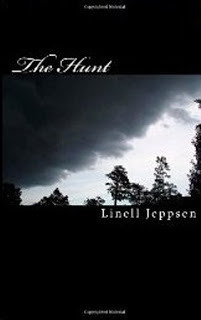 A blog on the history of vampires
A blog on the history of vampires
In the earliest days of man, when the saber toothed tiger stalked its prey, another predator came into being. This creature was two-legged, and walked upright, but could also fly, having bat like wings that stretched above it at a span of twelve feet, or more.
So starts The Hunt, by Linell Jeppsen. Although The Hunt takes place now, in the high woods of Washington State, everything that drives the plot line has its origins in ancient history.
Think of the giant Pterodactyl…The vampires in my novel are quite large, standing 6'5 to 8 ft. tall. They are strong and physically perfect. They also have gigantic leathery wings, which match their hair color and skin tone.
Raul, David and Lael are among the "Old Ones." David is gorgeous, with long golden brown hair and fierce eyes like an eagle. His sister, Lael is very pale, with dark red hair and eyes as blue and shiny as sapphires.
Even Raul, the villain of this story, is beautiful, with long blond hair that he keeps in dread-locks that fall past his knees and mesmerizing, black eyes.
In the late 1600's, a new vampire comes into being, the first of his kind. Because the vampire, like the dinosaur, is becoming extinct, David and Lael risk the wrath of the high vampire council, and create a vampire through the changing of blood. It is uncertain, at first, whether the old ones will allow Raphael to live; after all, humans are considered to be nothing more than feed-stock to the vampire.
Finally however, the elders of the council acknowledge that something must be done to save the vampire race from extinction. Now, with the advent of modern man and technology, the only thing that stands between humanity and the annihilation of the vampire race is the half-human king of the high council, Raphael Goldhawk.
The Hunt, slips back and forth from ancient times to present day and culminates in an epic show down between good and evil, love and hate. You will see how Raul has become psychotic and is consumed with hatred and revenge. You will learn why Holly Jensen is about to become a pawn in an ancient war, and in a love affair as old as time itself.
Although these vampires don't sparkle, or live in graveyards, or indulge in teen-age angst, they are filled with magic. They can turn into animals, and teleport…they can disguise their wings and walk amongst mankind. They are ancient, powerful beings…the very top of the Earth's food chain and will do anything to survive as a species.
This is dark, adult fantasy. These vampires are beautiful and deadly…they won't make you swoon, but gasp, and run away in fear. The humans in this tale are brave, terrified, vulnerable and strong. They are you and me. They are the prey, in a hunt as old as time.
Grab your camping gear and hunting license…it's time for THE HUNT!
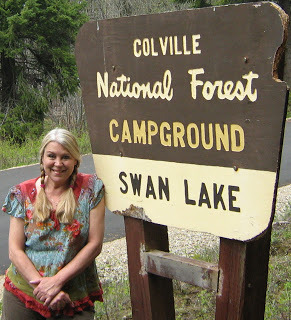 Synopsis of The Hunt
Synopsis of The Hunt
A ragged band of vampires are cutting a bloody band of destruction from Alaska to Washington State! As frost turns the leaves gold and paints the high mountain treetops silver, hundreds of hunters arrive in Swan Valley for their annual deer hunt. What they don't know is an outcast band of vampires have arrived as well.
Raphael Goldhawk, king of the high vampire council, has decreed the taking of human life unlawful. Raul Stannard, an ancient enemy of the half-human king, is determined to overthrow the council, even if it means the exposure and eventual annihilation of the vampire race.
Four people, a Ferry County forest ranger (Roger Atley), an Indian spirit-walker (Harley Truefeather), and a young married couple (Brian and Holly Jensen), are about to be caught up in an ancient power struggle, and in a love affair as old as time itself.
This novel combines ancient history with modern times, in an epic show-down between good and evil, love and hate. Grab your camping gear and hold on tight! It's time for The Hunt!
About the Author
Linell Jeppsen is a retired grocery store checker and high school custodian. She has been writing her entire life, but was recently chosen by Phyllis Scott Publishing for her novel, The Hunt.
She had previously won third place in a science fiction short story contest for The Gag Gift which is featured in Mixed Blessing and other Short Stories and The Last Astronaut.
She is now hard at work on her second novel titled Story Time. It is a science-fiction, post-apocalyptic novel, which is due to be released this fall.
For more information about Linell and her work please visit
• http://www.linelljeppsen.com/
• http://www.amazon.com/
• http://www.facebook.com/
• http://www.goodreads.com/

 A blog on the history of vampires
A blog on the history of vampiresIn the earliest days of man, when the saber toothed tiger stalked its prey, another predator came into being. This creature was two-legged, and walked upright, but could also fly, having bat like wings that stretched above it at a span of twelve feet, or more.
So starts The Hunt, by Linell Jeppsen. Although The Hunt takes place now, in the high woods of Washington State, everything that drives the plot line has its origins in ancient history.
Think of the giant Pterodactyl…The vampires in my novel are quite large, standing 6'5 to 8 ft. tall. They are strong and physically perfect. They also have gigantic leathery wings, which match their hair color and skin tone.
Raul, David and Lael are among the "Old Ones." David is gorgeous, with long golden brown hair and fierce eyes like an eagle. His sister, Lael is very pale, with dark red hair and eyes as blue and shiny as sapphires.
Even Raul, the villain of this story, is beautiful, with long blond hair that he keeps in dread-locks that fall past his knees and mesmerizing, black eyes.
In the late 1600's, a new vampire comes into being, the first of his kind. Because the vampire, like the dinosaur, is becoming extinct, David and Lael risk the wrath of the high vampire council, and create a vampire through the changing of blood. It is uncertain, at first, whether the old ones will allow Raphael to live; after all, humans are considered to be nothing more than feed-stock to the vampire.
Finally however, the elders of the council acknowledge that something must be done to save the vampire race from extinction. Now, with the advent of modern man and technology, the only thing that stands between humanity and the annihilation of the vampire race is the half-human king of the high council, Raphael Goldhawk.
The Hunt, slips back and forth from ancient times to present day and culminates in an epic show down between good and evil, love and hate. You will see how Raul has become psychotic and is consumed with hatred and revenge. You will learn why Holly Jensen is about to become a pawn in an ancient war, and in a love affair as old as time itself.
Although these vampires don't sparkle, or live in graveyards, or indulge in teen-age angst, they are filled with magic. They can turn into animals, and teleport…they can disguise their wings and walk amongst mankind. They are ancient, powerful beings…the very top of the Earth's food chain and will do anything to survive as a species.
This is dark, adult fantasy. These vampires are beautiful and deadly…they won't make you swoon, but gasp, and run away in fear. The humans in this tale are brave, terrified, vulnerable and strong. They are you and me. They are the prey, in a hunt as old as time.
Grab your camping gear and hunting license…it's time for THE HUNT!
 Synopsis of The Hunt
Synopsis of The Hunt A ragged band of vampires are cutting a bloody band of destruction from Alaska to Washington State! As frost turns the leaves gold and paints the high mountain treetops silver, hundreds of hunters arrive in Swan Valley for their annual deer hunt. What they don't know is an outcast band of vampires have arrived as well.
Raphael Goldhawk, king of the high vampire council, has decreed the taking of human life unlawful. Raul Stannard, an ancient enemy of the half-human king, is determined to overthrow the council, even if it means the exposure and eventual annihilation of the vampire race.
Four people, a Ferry County forest ranger (Roger Atley), an Indian spirit-walker (Harley Truefeather), and a young married couple (Brian and Holly Jensen), are about to be caught up in an ancient power struggle, and in a love affair as old as time itself.
This novel combines ancient history with modern times, in an epic show-down between good and evil, love and hate. Grab your camping gear and hold on tight! It's time for The Hunt!
About the Author
Linell Jeppsen is a retired grocery store checker and high school custodian. She has been writing her entire life, but was recently chosen by Phyllis Scott Publishing for her novel, The Hunt.
She had previously won third place in a science fiction short story contest for The Gag Gift which is featured in Mixed Blessing and other Short Stories and The Last Astronaut.
She is now hard at work on her second novel titled Story Time. It is a science-fiction, post-apocalyptic novel, which is due to be released this fall.
For more information about Linell and her work please visit
• http://www.linelljeppsen.com/
• http://www.amazon.com/
• http://www.facebook.com/
• http://www.goodreads.com/
Published on August 01, 2011 18:27
Immortyl Revolution
Author of Cara Mia, Book One of the Immortyl Revolution the first of a new vampire series.
- Denise Verrico's profile
- 51 followers



